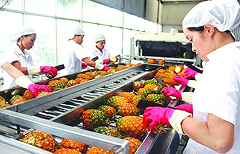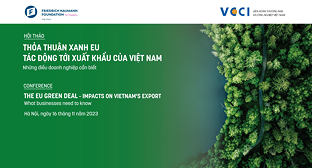Find opportunities in niche markets to increase exports
15/04/2024 09:20

Agricultural products are still the key
To support businesses in accessing the market, Vietnamese trade agencies abroad are actively providing information and connecting Vietnamese businesses with potential markets.
The Vietnam Trade Office in Algeria said that Vietnamese coffee and agricultural products have a lot of potential for export to the Tunisian market.
According to the Vietnam Trade Office in Algeria, Tunisia is a potential market for exporting coffee and agricultural products. Every year, Tunisia needs to buy 30,000 tons of raw coffee (mainly robusta) and 30,000 tons of rice. Basic commodities such as rice, sugar, raw coffee and green tea are exclusively imported by the Tunisian Trade Department through international bidding. Notably, in recent years, trade exchange between Vietnam and Tunisia has grown strongly, in which Vietnam exports products such as raw coffee, pepper, cashew nuts, seafood, machinery, equipment, razors, fabrics... and imports of seafood, dates, chemicals, plastic items, clothes, raw materials for animal feed...
Although it is a small country in North Africa with an area of 163,610 square kilometers and a population of about 12.5 million people, Tunisia is one of the most dynamic and competitive economies in the African-Arab region, international integration of extensive economy, convenient location near Europe (140km away). Tunisia has participated in eight multilateral and bilateral Free Trade Agreements (FTAs). Therefore, this can be considered a gateway for goods from countries, including Vietnam, to enter African and Arab markets, especially the North African region.
Senegal is also considered a potential market for rice exports. According to the Vietnam Trade Office in Algeria, Senegal is a large rice consuming market with an import volume of 900,000 to 1000,000 tons, mainly cheap 100% broken rice. This is one of the countries with the highest rice consumption per capita in West Africa, about 117 kg/person/year.
According to the country's Statistics Center, in 2023, Senegal's rice imports have reached 1.3 million tons with a turnover of more than USD 500 million, down 12.4% in volume and nearly 13% in value compared to 2022. The main supplying countries include India, Thailand, China, Pakistan, Uruguay, Vietnam... In addition to serving the domestic market of more than 18 million people, Senegal also imports rice to re-export to neighboring countries such as Mauritania, Guinea-Bissau and Gambia.
In 2023, Vietnam's rice exports to this market will reach 12,392 tons with a turnover of USD 5.35 million (an increase of 215%). In the first 2 months of this year, according to data from the General Department of Customs, Vietnam exported 414 tons of rice to Senegal with a turnover of USD 307,820.
According to the assessment of the Vietnam Trade Office in Algeria, Senegal is a large rice market with high import demand because domestic production does not meet domestic demand. Senegal is a member of the West African Economic-Monetary Union (UEMOA) including 8 French-speaking countries and the Economic Community of West Africa (ECOWAS) including 15 countries with a unified intra-bloc tariff schedule. Penetrating this market, Vietnamese rice not only meets the needs of 17.3 million Senegalese consumers but also has the opportunity to supply other countries in the bloc, especially neighboring countries such as Mali, Guinea Bissau, Republic of Guinea, Mauritania and Niger.
However, to export to this market, Vietnamese rice must compete fiercely in price with Indian, Thai, Pakistani and Spanish rice. Furthermore, rice exports to Senegal and Africa are still largely done through intermediaries from European or Middle Eastern traders.
Therefore, to increase rice exports to Senegal, the deal recommends that businesses need to have reasonable export prices because rice prices in countries such as India, Pakistan and Thailand are currently more competitive in price. In addition, with the Senegal market, besides the cheap price factor, it is necessary to understand the consumption needs of the people of this country for 100% broken rice. According to the deal, Vietnamese businesses should consider opening bonded warehouses and cooperating in investing in rice production and processing in these markets.
Opportunities in many new markets
In the European market, although Hungary is not a large market, there are still opportunities for exporting goods from Vietnam, especially agricultural products. According to the Vietnam Trade Office in this country, Hungary's import demand still increases every year, reaching over USD 100 billion /year. In particular, imports from Vietnam have increased sharply in recent years. In particular, the Free Trade Agreement between Vietnam and the EU has come into effect, continuing to open up great opportunities for Vietnamese businesses to develop goods trade and investment in the EU market and Hungary in the near future and vice versa.
According to the Vietnam Trade Office in Hungary, although the turnover is still low, some Vietnamese agricultural products such as cashew nuts, pepper, coffee... exported to Hungary account for a fairly high proportion of the total import turnover. These products are from Hungary (over 10%). This shows that these products are having a certain position in the local market. This is an opportunity for Vietnam to increase exports of these products to the Hungarian market.
The most disadvantageous point for goods exported to Hungary is the geographical distance while Hungary does not have a seaport; normally goods from Vietnam exported to Hungary are docked at some European countries with seaports such as Germany,
Netherlands, Italy... then brought to Hungary by road, leading to higher costs of imported goods into Hungary. On the other hand; because VAT in Hungary is very high (27%), many businesses import goods from Vietnam but carry out customs clearance procedures in some EU countries with seaports or places with low VAT and then distribute them there. Hungary.
Therefore, to effectively promote trade with this market, it is still necessary to organize business delegations to research the market, directly contact with local partners, and seek opportunities for business cooperation and investment; Organize and participate in business seminars to promote Vietnamese exports, connect business and investment; organize programs to display and promote Vietnamese export goods; proactively seek local importers and distributors to introduce to Vietnamese exporters and vice versa.
Source:Custom News
Các tin khác
- Exports face challenges despite enjoying robust growth (26/04/2024)
- Vietnam ranks fifth among aquatic product suppliers for Singapore (26/04/2024)
- Some firms likely to close due to higher anti-dumping tariff on plywood products in S Korea (26/04/2024)
- Foreign businesses increasingly seek export sources in Vietnam (26/04/2024)
- Japan's investigation into China's graphite electrodes to 'affect regional cooperation' (26/04/2024)
 Home
Home
 About Us
About Us




















